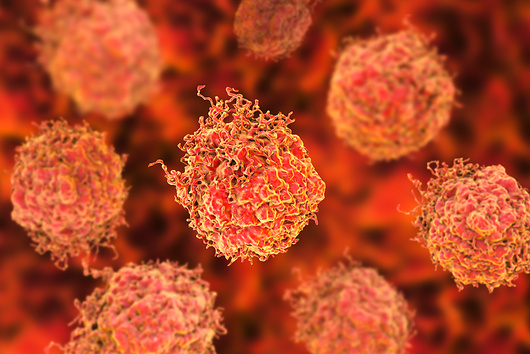
While nuclear mutations are widely acknowledged as a driver of cancer tumours, the role of maternally inherited mitochondrial genome mutations has not been extensively explored – but now a paper from a prolific TFRI-funded team has suggested an important interplay between the two mutations when it comes to prostate cancer tumours.
The study was recently published in Nature Communications and spearheaded by Drs. Julia Hopkins, Paul Boutros (Ontario Institute for Cancer Research) and Dr. Robert Bristow (formerly with Princess Margaret Cancer Centre). The human genome consists of two genomes – the nuclear and mitochondria – although the nuclear genome is the predominant focus in most cancer research. The present study took a unique approach, analyzing the mitochondrial genomes of 384 localized prostate tumours and identifying numerous mitochondrial single-nucleotide variants (mtSNVs).
The results were significant: the mitochondrial genomes of prostate cancer patients showed the potential for nuclear variants to interact with mitochondrial variants in a form of “cross-talk”. Mitochondrial mutations displayed a complicated interplay with nuclear mutational characteristics, and the two appear to work together to determine and drive tumour aggression.
The team also found a link between mitochondrial mutations and biochemical relapse, and patients with both mutations in a specific non-coding region of the mitochondrial DNA and MYC copy number aberrations appear to have worse outcomes than those without. Further, older patients had more mtSNVs compared to those diagnosed at a younger age, a finding the researchers intend to investigate more.
Proteins encoded in the mitochondrial genome are all part of the Oxidative phosphorylation pathwayand mutations in these genes can affect mitochondrial function, which has been shown to be essential for tumour development. Given this, the team believes it is important to identify any mutations in the mitochondrial genome, as well as to include its analysis in whole genome studies. The study suggests the addition of mtSNVs to prognostic biomarkers may be an effective way of improving prediction of patient outcome, supporting triage of patients with low-risk disease to surveillance protocols and with high-risk disease to adjuvant therapy regimens.
Prostate cancer is the third leading cause of cancer-related death in Canadian men. Some types are aggressive and lethal, requiring aggressive treatment, while others are considered indolent and treatment may not be needed. These study findings can be used as a resource for future work in prostate cancer. It also underscores the importance of including the mitochondrial genome in future genomic analysis studies.
Study: Mitochondrial mutations drive prostate cancer aggression
Authors: Julia F Hopkins, Veronica Y Sabelnykova, Joachim Weischenfeldt, Ronald Simon, Jennifer A Aguiar, Rached Alkallas, Lawrence E Heisler, Junyan Zhang, John D Watson, Melvin LK Chua, Michael Fraser, Francesco Favero, Chris Lawerenz, Christoph Plass, Guido Sauter, John D McPherson, Theodorus van der Kwast, Jan Korbel, Thorsten Schlomm, Robert G Bristow & Paul C Boutros
Funding: This project was supported in part by a Terry Fox Research Institute New Investigator Award to Paul C. Boutros.